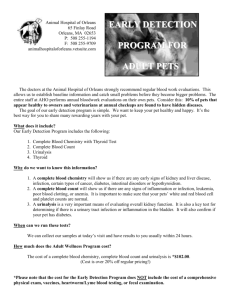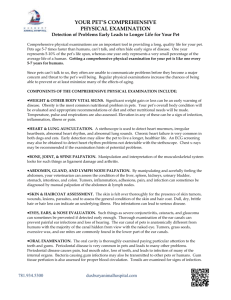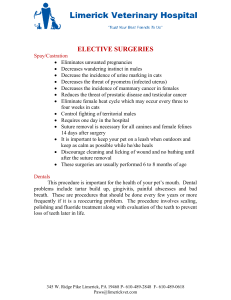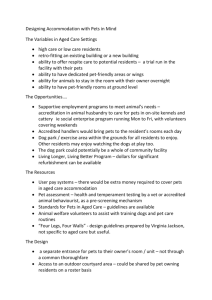Providing compassionate care for an important member of your
advertisement
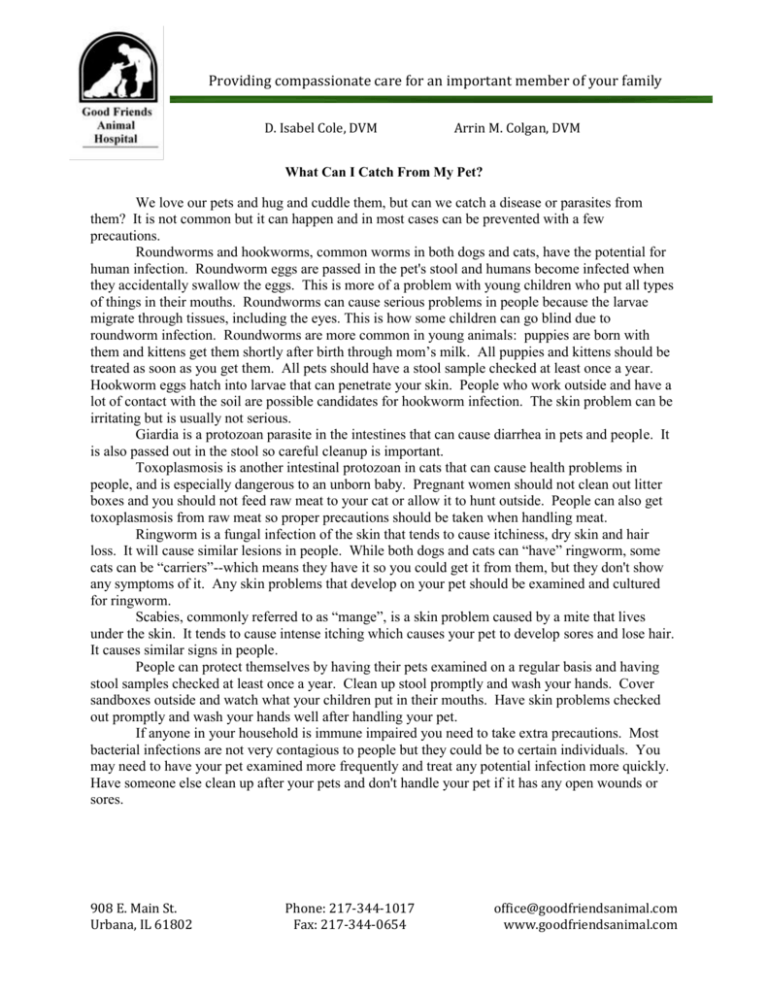
Providing compassionate care for an important member of your family D. Isabel Cole, DVM Arrin M. Colgan, DVM What Can I Catch From My Pet? We love our pets and hug and cuddle them, but can we catch a disease or parasites from them? It is not common but it can happen and in most cases can be prevented with a few precautions. Roundworms and hookworms, common worms in both dogs and cats, have the potential for human infection. Roundworm eggs are passed in the pet's stool and humans become infected when they accidentally swallow the eggs. This is more of a problem with young children who put all types of things in their mouths. Roundworms can cause serious problems in people because the larvae migrate through tissues, including the eyes. This is how some children can go blind due to roundworm infection. Roundworms are more common in young animals: puppies are born with them and kittens get them shortly after birth through mom’s milk. All puppies and kittens should be treated as soon as you get them. All pets should have a stool sample checked at least once a year. Hookworm eggs hatch into larvae that can penetrate your skin. People who work outside and have a lot of contact with the soil are possible candidates for hookworm infection. The skin problem can be irritating but is usually not serious. Giardia is a protozoan parasite in the intestines that can cause diarrhea in pets and people. It is also passed out in the stool so careful cleanup is important. Toxoplasmosis is another intestinal protozoan in cats that can cause health problems in people, and is especially dangerous to an unborn baby. Pregnant women should not clean out litter boxes and you should not feed raw meat to your cat or allow it to hunt outside. People can also get toxoplasmosis from raw meat so proper precautions should be taken when handling meat. Ringworm is a fungal infection of the skin that tends to cause itchiness, dry skin and hair loss. It will cause similar lesions in people. While both dogs and cats can “have” ringworm, some cats can be “carriers”--which means they have it so you could get it from them, but they don't show any symptoms of it. Any skin problems that develop on your pet should be examined and cultured for ringworm. Scabies, commonly referred to as “mange”, is a skin problem caused by a mite that lives under the skin. It tends to cause intense itching which causes your pet to develop sores and lose hair. It causes similar signs in people. People can protect themselves by having their pets examined on a regular basis and having stool samples checked at least once a year. Clean up stool promptly and wash your hands. Cover sandboxes outside and watch what your children put in their mouths. Have skin problems checked out promptly and wash your hands well after handling your pet. If anyone in your household is immune impaired you need to take extra precautions. Most bacterial infections are not very contagious to people but they could be to certain individuals. You may need to have your pet examined more frequently and treat any potential infection more quickly. Have someone else clean up after your pets and don't handle your pet if it has any open wounds or sores. 908 E. Main St. Urbana, IL 61802 Phone: 217-344-1017 Fax: 217-344-0654 office@goodfriendsanimal.com www.goodfriendsanimal.com
